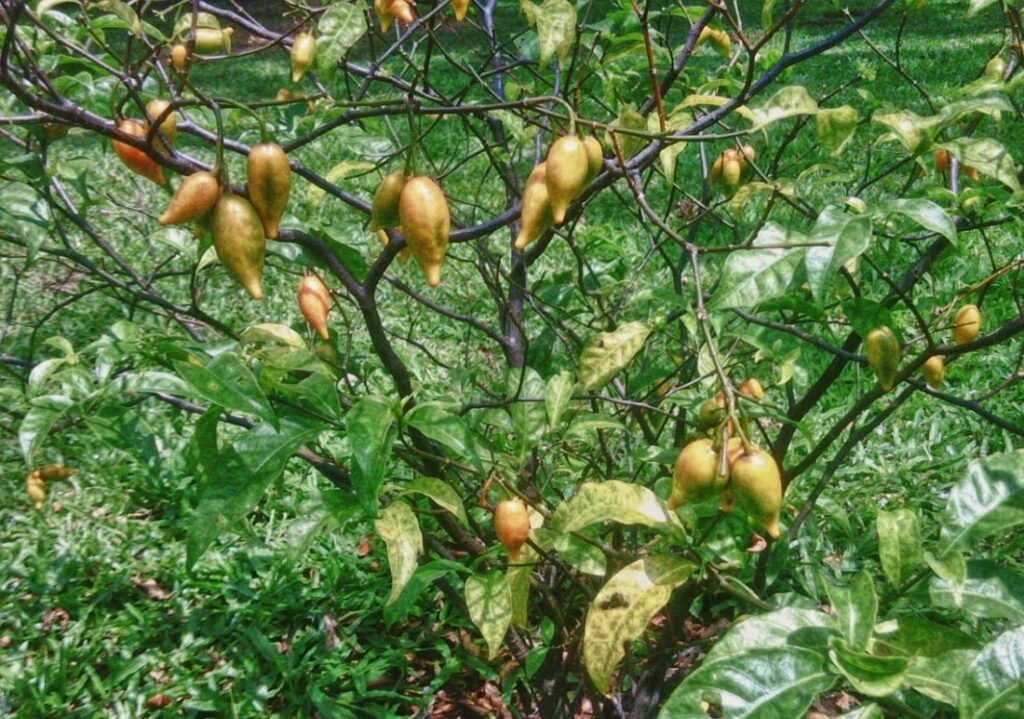What Is Iboga?

The word “Iboga” comes from the Tsogo verb “boghaga,” meaning “to care for,” and refers to the Tabernanthe iboga shrub native to the equatorial rainforests of West Africa.
Found in Gabon and some areas of the Congo basin, the iboga root bark has a bitter taste and contains a powerful psychoactive alkaloid, ibogaine, that has been impactful in the West for treating addiction and mental health issues, although it also generates controversy.
The Tabernanthe Iboga plant made its way to Europe in the late 19th century and was historically used for millenia by tribes in Gabon and Cameroon for Bwiti, their spiritual practice.
Crucially, in Gabon traditions pertaining to African medicinal plants, the iboga plant’s importance links to its connections with spiritual customs like Bwiti, observed by communities spanning around fifty ethnic groups.
Known as “sacred wood” or “bois sacré”, iboga is a venerated medicinal plant with a central role in traditional initiation rites and healing methods.
In Gabon and Africa as a whole, traditional healing, assisted by spirituality and traditional practitioners, is not just prevalent but a widely accepted healing method. A Nganga, or spiritual practitioner, provides support across all life facets.
The iboga plant is often personified as a being with a soul, bridging humans and the spiritual domain. It doesn’t heal directly but fosters conditions for healing.
Bwiti healers suggest the iboga plant’s efficacy in treating substance use disorders, recognized in Western nations, comes from the plant’s ability to cleanse and rejuvenate the spirit. This process enables introspective examination of past incidents, even those at the edges of awareness, and resolves spirit-related afflictions, like substance use disorders.
The Bwiti and the Iboga Plant
Bwiti, an official religion in Gabon, primarily followed by the forest-dwelling Babongo, Mitsogo, and Fang peoples, extends from Gabon to Cameroon.
Bwiti spiritual practice centers on the ceremonial ingestion of the iboga root. Used in various sacred rituals, iboga has potent psychoactive properties and is believed to bring spiritual enlightenment and communication with ancestral spirits.
At the heart of Bwiti is ongoing conversation with ancestors and a respect for the balance between the living and the deceased, the natural and the spiritual. Bwiti cosmology suggests a remote god, the universe’s creator, who doesn’t interfere in its workings. Thus, ancestors and spiritual beings are primary entities invoked and placated.
Bwiti followers use dance, music, and sacred artifacts to invite spirits and ancestors into their ceremonies. They commonly gather in a temple, or “nzo,” especially on Saturday evenings and the eve of religious holidays for communal rites lasting until dawn.
These communal rites serve several functions: a platform for religious practice, a tribunal for resolving disputes, a healing center where therapeutic processes unfold, and a hub for community news and collective decision-making.
Since its introduction to the West, more attention has been given to the iboga plant, with its derivative alkaloid, ibogaine, primarily used in successful interruption of addictive behavior patterns.
However, the media’s focus on iboga as an addiction interrupter pushes its diverse benefits to the sideline. Here are some reasons to consider iboga usage.
Why Take Iboga?
Iboga is for those ready to free themselves from physical, mental, emotional, and spiritual distress, opening the path to realizing their innate capabilities.
Physical
Full body cellular detoxification aids in purifying the body at a cellular level, facilitating toxin removal. Simultaneously, chemical detoxification targets harmful accumulated chemical substances such as heroin, oxycontin and other opioids, crack/cocaine, spice/K2, methamphetamine, nicotine and more. The process enhances neuroplasticity, crucial for learning and recovery from injury.
Mental
The treatment optimizes brain functioning by resetting neurotransmitter levels such as dopamine and serotonin, enhancing cognitive functions, and overall mental health. A mental detox purges negative thought patterns hindering growth and happiness, essential for healing past traumas, calming anxiety, and promoting clarity and peace of mind.
In addition to relieving anxiety, depression and anhedonia symptoms, behavioral addictions such as gambling, eating disorders, and Obsessive Compulsive Disorder (OCD); it also aids in healing Post Traumatic Stress Disorder (PTSD) and Complex PTSD. This potent alkaloid, ibogaine, is particularly beneficial in addiction recovery, fostering resilience against addictive behaviors and substances.
Emotional
Emotionally, individuals can expect increased strength and security, enabling facing life’s challenges with greater confidence and resilience.
This therapy provides grounding and centering, offering stability in emotional turbulence. Furthermore, it helps in releasing unhealthy attachments potentially leading to emotional distress and interrupts vicious cycles and negative feedback loops to pave the way for healthier emotional habits and responses.
Spiritual
Spiritually, this approach offers a deep cleansing effect, purifying one’s spiritual essence from negative influences or energies, allowing for ancestral healing and mending spiritual wounds across generations. Moreover, it fosters a deeper connection with one’s True Self or Soul, promoting inner peace and alignment. Ultimately, it assists individuals on their journey of self-discovery, offering insights into their true nature and purpose.
Here at Ibogaine Treatment UK (Iboga Root Sanctuary), we administer the alkaloid ibogaine in a luxury retreat setting, with medical supervision throughout, to ensure our clients’ safety.
Should you, or anyone you know be suffering from any of the above conditions, contact us to find out if ibogaine is for you.
